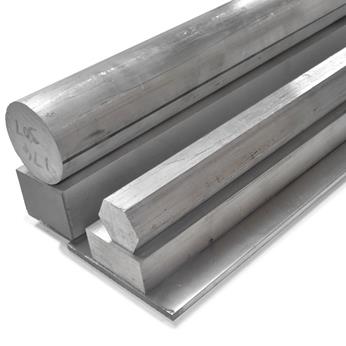Aluminum
 Aluminum is remarkable for the metal's low density and for its ability to resist corrosion. Structural components made from aluminum and its alloys are vital to the aerospace industry and are important in other areas of transportation and structural materials.
Aluminum is remarkable for the metal's low density and for its ability to resist corrosion. Structural components made from aluminum and its alloys are vital to the aerospace industry and are important in other areas of transportation and structural materials.2011 – This free machining alloy compares favorably with free cutting brass. It is the most suitable alloy for machining on automatics, milling machines, lathes, planers, shapers and other machine tools, and is the most widely used alloy for all types of screw machine parts. It can be machined at high speeds and comparatively heavy feeds. Machined surfaces are bright and smooth. Mechanical finishes readily match joined parts. Mechanical properties and hardness are excellent; corrosion resistance fair. Weldability by resistance method is fair; other welding is not recommended.
2024 – Known as the “aircraft alloy” in machining rod, this alloy has properties higher than 2017 and 2014. Though formability is generally considered only fair in the cold state, it is one of the most popular alloys for cold heading and roll threading applications. Can be machined to a high finish. Corrosion resistance is fair. Applications include Phillips head screws, wood screws, hydraulic fittings and small parts in clocks and meters. It is also the basic alloy for cold finished rectangular bar where strength and machinability are essential for precision fittings and parts.
6061 – Generally selected where welding or brazing is required, or for its particularly high corrosion resistance in all tempers. Formability is excellent in 0 temper, good in T4. Machining is more difficult than with other machining alloys; it is particularly gummy in 0 condition, fair in hard tempers. Corrosion resistance and appearance after anodizing are highest of screw machine alloys, though properties are generally lower. Applications include railway car components, bridge components, pipe fittings, wheels and various transportation end uses.
7075 – 7075 has been the strongest and hardest alloy sold commercially for decades. 7175 is more pure, but may not be suitable for fracture toughness applications. The superior stress corrosion resistance of the T73 and T7351 tempers of 7075 rolled or cold finished rod have made them a logical replacement for alloys 2014, 2017 and 2024 in many of the most critical applications. In machined parts and forgings it is used primarily in aircraft, ordnance, highly stressed structural applications, keys, small gears, etc. It is more difficult to forge than other alloys, but is often selected because of its properties. Machinability is good, resistance welding satisfactory, finishing characteristics excellent, and corrosion resistance fair.
Comments
Post a Comment